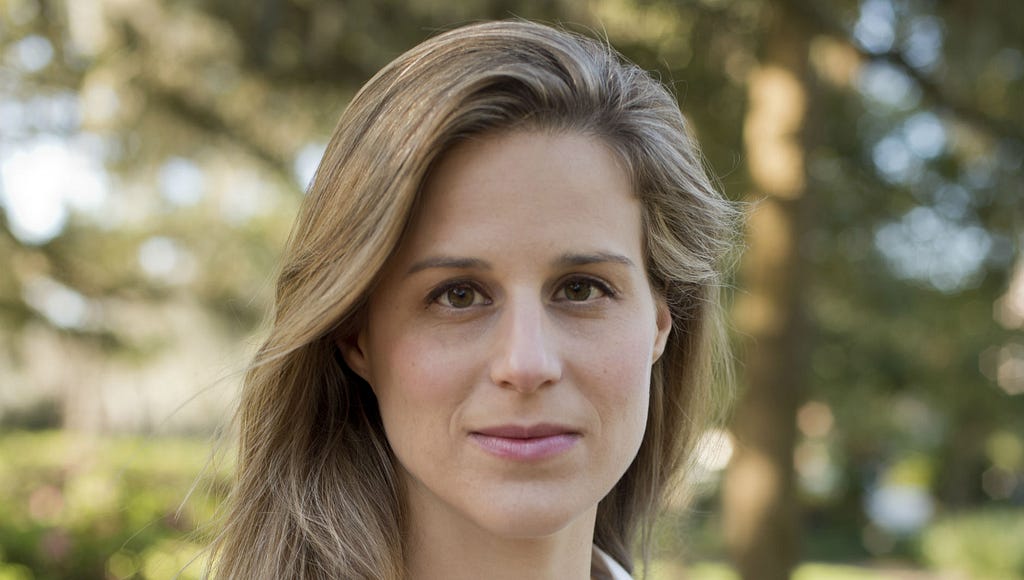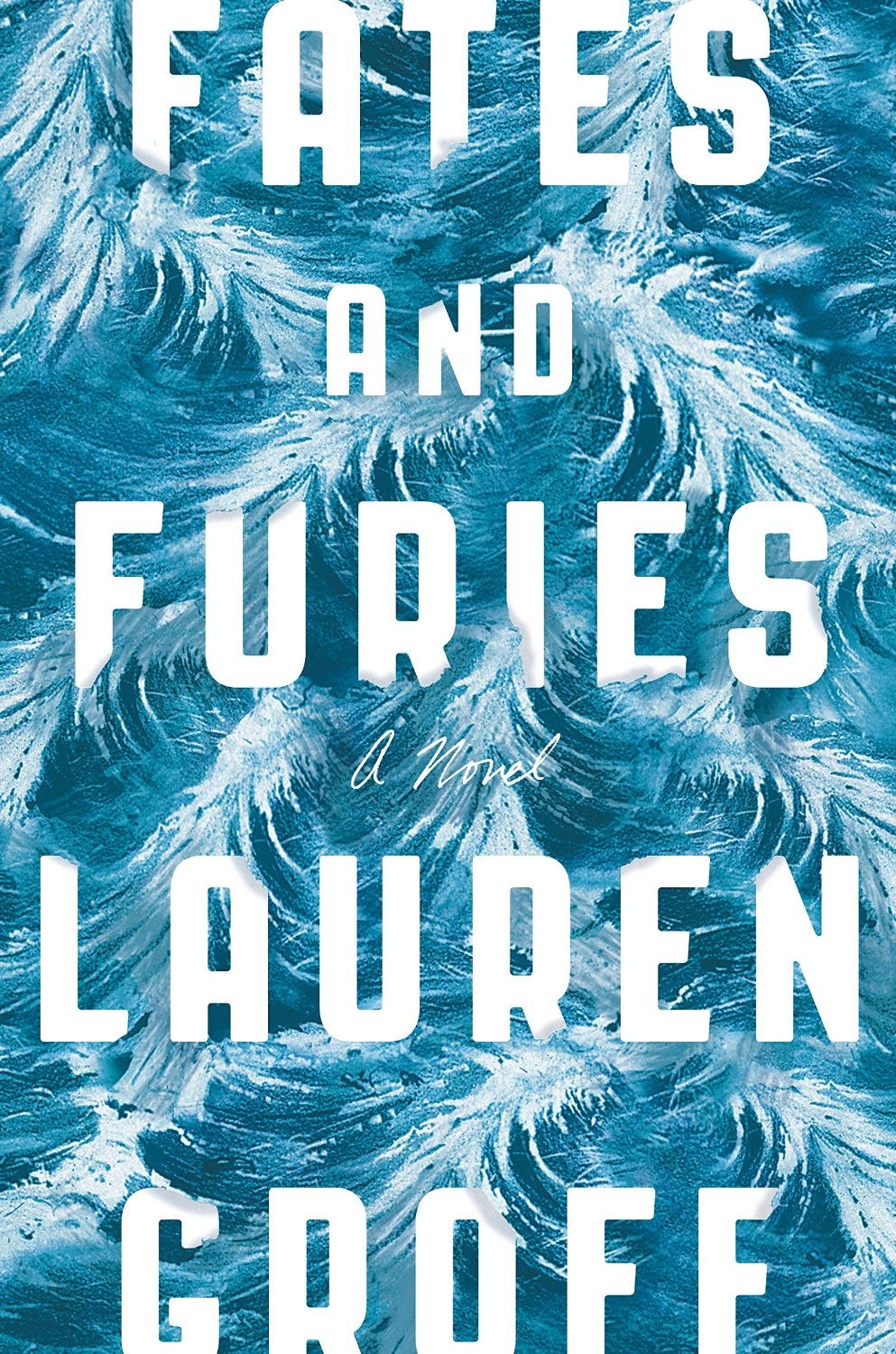interviews
My World Is Full Of Vagueness And Myth: An Interview With Lauren Groff, Author Of Fates and Furies

by Natalie Villacorta


The form of Lauren Groff’s new book, Fates and Furies, is split into two parts, a division which reflects its content: the stories of a husband and a wife, deeply interwoven but managing, necessarily, to remain separate.
Fates tells the life story of Lancelot “Lotto” Satterwhite, who struggles to find a role in the acting world before discovering his talent is for writing plays, not starring in them. In Furies, Lotto’s wife, Mathilde takes center stage, telling a different version of the life built in the first part of the book. The halves are united by an omniscient voice represented by bracketed text that recalls a Greek chorus.
Groff and I spoke about narcissists, serial killers (the writer kind), and mansplaining.
Natalie Villacorta: The novel is about a playwright whose work is heavily influenced by Greek mythology, including the stories of Antigone, Odysseus and the Sirens, and the book takes its title from mythological figures, the Fates and Furies. How did you get interested in Greek stories and incorporate them into your own work?
Lauren Groff: During the process of writing this book, I read the Iliad, and I loved it. It’s such an incredible narrative; nobody needs to write a book now because the Iliad exists in the world. As I was reading it, I thought the underlying philosophical concepts were fascinating, what people take for granted as their world view was so interesting to me. So, in my book, Lotto believes — as many people who have a lot of privilege do — that he didn’t get what he got because of luck, he got what we got because he worked really hard at it and, in a way, that’s a lie. We all get what we get because of luck. But at the same time he also feels that he is fated for greatness, it’s in his stars. And this is what he is told from day one. Whereas Mathilde is very much the opposite and what I love the most about these ideas of the three Fates and the three Furies is they’re the most powerful goddesses there are. The Fates measure out life and they create it and they decide when to snip it out. And the Furies are these deep ancient goddesses who are avenging angels — their purpose is to go after malefactors. And I think we’ve gotten away from representations of women as powerful people and I got really excited about the mythology.
NV: Throughout the book, snippets of text appear in brackets. It feels like that text is the voice of each character’s conscience, or the chorus in a Greek play. Sometimes these sections tell the reader what is to come or reveal when a character is lying or mistaken. What were you trying to achieve with those sections? Why separate that text out?
LG: There are two reasons: One is I thought it was really fun. I like to have the long view on these characters as well as the intimate close view and I wanted to signal it too. But the other reason is I needed to marry both sides of the book and that was one way to have a through-line through both parts of the book. That sort of external, a little bit snarky voice. Because at first I had thought that this book was actually two books — a sort of Mr. Bridge and Mrs. Bridge or Old Filth and the Man in the Wooden Hat. And eventually, when I realized its structure was actually more like a marriage, I had to find ways to thread them together.
NV: The book includes many excerpts from Lotto’s plays that are just dropped into the narrative. How did you make that call and have you ever considered writing plays yourself?
Marriage is this paradoxical thing that’s both incredibly intimate, but also performative.
LG: This book is about creativity as much as it’s about anything else, and it’s about a lot of things. I wanted to be able to show how we take the events of our lives and transform them. And it occurred to me that plays are so easily summarized and excerpted. Also, it’s fun and Lotto actually sees his life as if he’s the actor in the middle of a play. He is the central character in his own narrative. Marriage is this paradoxical thing that’s both incredibly intimate, but also performative. Weddings are these elaborate performances put on for the people we love. There’s this external aspect to it. So I wanted to call all those into question throughout the book, and I think excerpting the plays was a way to do all of those things.
NV: After the production of one of his plays that draws directly from Lotto’s past, his sister says “you have to be a serial killer on the inside to do what you do to us. Put us in your plays, warts and all, showing us off like we’re some sort of sideshow freaks.” You’ve written a novel about a town that’s drawn from the town you grew up in, Cooperstown, NY. Have you ever been accused of something similar by your family and friends? How has this impacted your work?
And it’s true, you do feel like a serial killer in a certain way, or a robber, you’re stealing some essential piece of them.
LG: I put everyone I know into something of mine — whether or not they know that I’ve done it. And it’s true, you do feel like a serial killer in a certain way, or a robber, you’re stealing some essential piece of them. Part of the impetus for this book is frankly an apology to my husband for my own innate narcissism. To make anything and believe that other people would want to see it, it’s an incredibly narcissistic act. I put my work first, and my kids know it, my husband knows it. I’m a writer first and then I live my life second, and I know that sounds really sad, but that’s the way I organize things. So in a really major way this book is an apology to my husband, whom I have stolen from in order to create Lotto. I mean, my husband’s also 6 foot 6; my husband was an actor for a little while; he’s a really kind human being from Florida. So it’s unfair, and I was poking fun at myself in that excerpt but I was also poking at all of us who dare create things out of the people that we know and love.
NV: Yes, throughout the book, artists are called narcissists. One character remarks, “The balls is took to proclaim a creative profession, the narcissism.” So do you think narcissism essential to an artist’s success?
I don’t know if it’s the form of the novel that makes me believe that all novelists are probably at heart serial killer narcissists…
LG: I don’t know if it’s essential. I mean, you look at someone like Emily Dickinson and you just assume that she wasn’t. Her poems seem very private very internal and reflective. I don’t know if it’s the form of the novel that makes me believe that all novelists are probably at heart serial killer narcissists because, to be honest, the novelists I know are the kindest people on the planet. It’s not mutually exclusive. I think you have to have a certain level of empathy and curiosity for other people and that is manifested in generosity and kindness. But in order to publish a book, which is not what Emily Dickinson really truly did during her life, in order to make art that you hope is disseminated to a large group of people, I think you do. You have to have that sort of need to be looked at. …You gotta be a killer.
NV: After Lotto writes his first play, his wife says, “You were meant to be a playwright, my love.” And later in the book, his mother says from his birth she “molded” him to become an artist. Do you think people are “meant” to be writers or are they “molded”? Does it take another person’s belief to make someone realize his or her potential as an artist?
LG: It’s a difficult mix of both. If you don’t have the external support it’s incredibly hard to get a foothold. But if you don’t have that internal molding — which you have to do for yourself; nobody else can do it for you — then you’re not going to succeed in making anything you think speaks some sort of truth. I’ve been thinking a lot about this because one of the unspoken things about this book is privilege — particularly Lotto’s privilege — he’s white, he is male, he is rich, he has an education, and he has all these people around him who have made everything very easy for him. And I think it’s easy when you’re a creative person to take that for granted, which is what he does. Anybody has the ability to be an artist — it’s whether they want to claim that ability and whether or not they have the external support that is sometimes invisible.
NV: Lotto is accused of being a misogynist after comments he makes on a university panel: “We’re all given a finite amount of creativity….if a woman chooses to spend hers on creating actual life and not imaginary life, that’s a glorious choice. When a woman has a baby, she’s creating so much more than just an imaginary world on the page! … the reason for the disparity in creation is because women have turned their creative energies inward, not outward.” What do you find problematic about Lotto’s speech?
There’s a biological determinism in a lot of the discussions about male and female creativity that I find incredibly frustrating and infuriating.
LG: Someone said that to me actually. Some man stood up and actually mansplained a woman’s creativity to me, which I didn’t take very well, obviously. It’s something that I think people probably don’t think explicitly. But it’s so taken for granted that women have not created beautiful masterpieces of literary fiction in general. If you look at the Guardian’s 100 Best Books ever there’s like two from women. And it’s not that women haven’t created these books. It’s that the men have not looked at them. They don’t get on that list and people don’t read them and then they get left off every other list. There’s a biological determinism in a lot of the discussions about male and female creativity that I find incredibly frustrating and infuriating. And there’s a part of me that just gets enraged when I hear people say things like what that man said to me — I could barely see — because it’s not the way that I’ve experienced it. It’s not biology; there’s no mommy trap. I think there are forces in the society around us that do not allow the voices of women to have the effect that they should have. This is a deeply feminist book. Just because Mathilde makes decisions that I do not know if I would make doesn’t mean her story is not a feminist story.
NV: At one point, Lotto steals a story from Mathilde’s life and tells it as if it happened to him. She is angry. He says, “What’s yours is mine and what’s mine is yours.” Has this happened in your own writing?
LG: I’ve been married for nine years but I have been with my husband since I was 21. So we’ve grown up together in lots of ways. I steal his stories on a daily basis. I’m just a better storyteller. So we sit down at dinner parties and I’m the one who tells the story as if they happened to me. And in a certain way, I’ve told it so many times, it is. It’s my memory. And it’s not fair. It’s this growth that happens in a marriage. But I see it with my parents too. Yesterday they celebrated 42 years of being married. They’ve grown so much into one another that it’s sometimes hard to see the outlines of each individual. That said, you are a single person within this unity and there are no hours of the day that go by that I don’t think something that would hurt my husband very deeply. As you grow together you also stay a ferociously autonomous being.
NV: That gets at another part of the book — each character has a version of the story of Lotto’s proposal to Mathilde. In his version, she says, “sure.” In hers, she says, “no.” It seems both are true. How can that be?
LG: I resist very much the idea that there’s any single story for anything. One person walks down the street and there would be 500 different ways of telling it. There’s no such thing as absolute truth, except for science — even that is often proven wrong eventually. I love the idea that narratives are these separate textures and have separate weaves and it all depends on the relationship of the teller to the time that they’re telling it. This novel could be told from Chollie’s point of view, and it would be a completely separate book.
It’s possible that because I’m in my late 30s now, I’m just resisting the constant barrage that people are feeding us that things are black and white, and there’s only one way to think about these things, and there’s no bleed between things. My world is full of vagueness and myth, and I think that’s more beautiful in a lot of ways.
NV: You can see that difference in the structures of the two parts of the book. The first part is pretty much a chronological story of Lotto’s life. But the second part is haphazard — shifting from Mathilde’s childhood to the present setting to her future as an old lady and back again. How did that structural change happen and was it intentional?
LG: Deeply intentional. I was building a bildungsroman in Lotto’s half, which is a very traditional form of the novel and it has at its heart usually a man and he is the central figure. I built that in the first part in order to try to explode it in the second part. It was deeply satisfying. I wrote them at the same time. It was this joyous experience of trying to see this world of these people but from many different points of view.
NV: Lotto appears on a panel to discuss the future of theater. He says that the key is “innovation in storytelling and inverting narrative expectations.” How does that speak to your own approach to writing and thoughts about the future of the novel?
LG: I don’t know if I even agree with his statement. Because I think that you tell the story in the way that will tell the most truth. It doesn’t necessarily have to do with inverting narrative expectations. My only allegiance is to telling the story in the way that I think is best for the story. I don’t love innovation for innovation’s sake.









